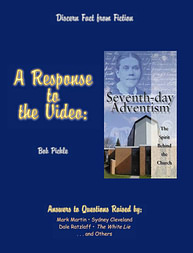|
A Response to the Video:
Seventh-day Adventism, the Spirit Behind the Church
by Bob Pickle
Answers to Questions Raised by:
Mark Martin, Sydney Cleveland
Dale Ratzlaff, The White Lie
. . . and Others
Discern Fact from Fiction
Salvation, Grace, and Obedience
< Prev T. of C. ... 149 150-151 152 153 154 155 156-158 159 160 ... Next >
| #154: "In fact being under the law leads to
sin. 1 Corinthians 15:56 says, 'The strength of sin is the
law.' "—Mark Martin. |
#154: Being under the law leads to
sin. Mr. Martin appears to be saying that obeying the law leads to sin. This is
a rather strange
conclusion, for how can obeying the law lead to breaking the law?
What shall we say then? Is the law sin? God forbid. Nay, I had not known sin, but by
the law: for I had not known lust, except the law had said,
Thou shalt not covet. (Rom. 7:7)
Therefore by the deeds of the law there shall no flesh be justified in his sight: for by
the law is the knowledge of sin. (Rom. 3:20)
According to the New Testament, while the law cannot save us, it does define what sin
is. As we saw under #152, "under the law" means
"under the condemnation of the law." These simple Bible facts make it clear that, rather than
being under the law leading to sin, sin is what puts
us under the law.
The text cited, 1 Corinthians 15:56, is an interesting one. What does it mean?
Consider the thoughts on this very verse found in these well-known commentaries written by
scholars who were not Seventh-day Adventists:
[N]ot that the law of God is sinful, or encourages sin: it forbids it under the severest
penalty; but was there no law there would be no sin, nor
imputation of it; sin is a transgression of the law: moreover, the strength of sin, its evil
nature, and all the dreadful aggravations of it, and sad
consequences upon it, are discovered and made known by the law; and also the strength of it
is drawn out by it, through the corruption of human
nature; which is irritated and provoked the more to sin, through the law's prohibition of it;
and this is not the fault of the law, but is owing to the
vitiosity of nature; which the more it is forbidden anything, the more desirous it is of it; to
which may be added, that sin is the more exceeding sinful,
being committed against a known law, and that of the great lawgiver, who is able to save and
to destroy; whose legislative power and authority are [p. 103]
slighted and trampled upon by it, which makes the
transgression the more heinous; it is the law which binds sin upon a man's conscience,
accuses
him of it, pronounces him guilty, curses, condemns, and adjudges him to death for
it.—Gill's Expositor and the Body of Divinity.
The strength of sin. Its power over the mind; its terrific and dreadful
energy; and especially its power to produce alarm in the hour of death.
Is the law. The pure and holy law of God. This
idea Paul has illustrated at length in Rom. 7:9-13, and he probably made the statement here
in
order to meet the Jews, and to show that the law of God had no power to take away the fear
of death; and that, therefore, there was need of the
gospel, and that this alone could do it. The Jews maintained that a man might be justified
and saved by obedience to the law. Paul here shows that
it is the law which gives its chief rigour to sin, and that it does not tend to subdue or destroy
it; and that power is seen most strikingly in the pangs
and horrors of a guilty conscience on the bed of death. There was need, therefore, of the
gospel, which alone could remove the cause of these horrors,
by taking away sin, and thus leaving the pardoned man to die in peace.—Barnes'
New Testament Notes.
Without the law sin is not perceived or imputed (Rom. 3:20; 4:15; 5:13). The law
makes sin the more grievous by making God's will the clearer.
(Rom. 7:8-10).—Jamieson, Faussett, and Brown.
The law, broken, is sin, and when this law is consciously broken the conscience is
wounded. When a moral law is broken, moral death follows.
If there was no law of any kind, there would be no sin, no wounded consciences, no moral
death. See Rom. 7:7.—Peoples New Testament Notes.

|

|
Like this book?
Save your printer and your ink!
Buy the entire 160-page book for
just
$9.95 + S/H.
Automatic discounts start
at 5 copies.
|
|
|
< Prev T. of C. ... 149 150-151 152 153 154 155 156-158 159 160 ... Next >
|



